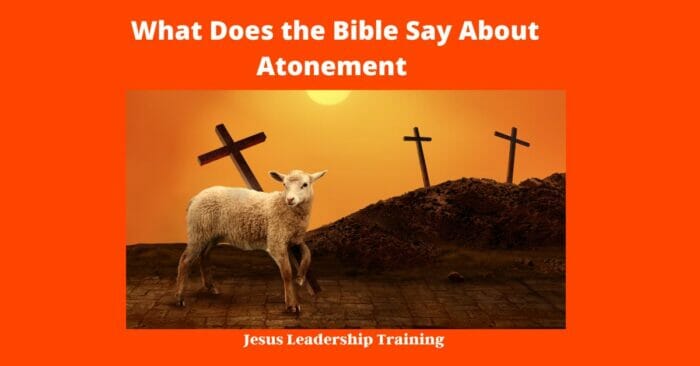What Does the Bible Say About Atonement – The Bible is filled with stories and teachings about atonement, a process by which one can be reconciled to God. In the Old Testament, atonement is described as the payment of a price for sin and disobedience to God. The most well-known example is the atoning sacrifice of Jesus Christ, the Son of God, who died on the cross for the sins of humanity.
The New Testament also speaks of atonement, describing it as a complete forgiveness of sins through the grace and mercy of God. The Bible also emphasizes the importance of repentance and faith, both essential elements of atonement. By turning away from sin and trusting in God’s saving power, believers can receive the blessing of atonement in their lives.
Table of Contents
What is Atonement
Atonement is an important theological concept found in the Bible and is central to the Christian faith. It is based on the idea that God, who is perfect and holy, requires a perfect sacrifice to atone for the sins of humanity. Atonement is the process by which God provides forgiveness for those who have sinned against Him.
When the Bible talks about atonement, it is referring to the act of reconciliation between God and humanity. Atonement is the process by which God restores a broken relationship, making it possible for us to be forgiven and to be reconciled with Him.
In the Old Testament, atonement was made through the sacrificial system, and it was a way for people to make amends for their sins. In the Old Testament Law, the people of Israel were commanded to bring offerings of animals as a way to atone for their sins. This was known as the atonement offering, and it was a symbol of the shedding of innocent blood.

In the New Testament, Jesus is seen as the ultimate atonement offering. He is the perfect sacrifice, and He atones for the sins of all people who accept Him as their Lord and Savior. Through His death on the cross, Jesus paid the price for our sins and opened the way for us to be reconciled with God.
The term “atonement” has come to mean more than just the act of reconciling us to God; it is also used to refer to a spiritual transformation that takes place within us. Through the atonement of Jesus, we can experience a deep spiritual renewal and transformation in our lives.
Atonement is an important doctrine of the Christian faith and is essential to understanding the Christian concept of salvation. Without atonement, we cannot be reconciled to God, and therefore, we cannot experience the fullness of His love and grace.
In the Bible, the atonement of Jesus is referred to as the “propitiation” of God. This is the act of making peace with God, or reconciling us to Him. Propitiation is necessary for us to experience the fullness of God’s love and grace. Through Jesus’ atoning sacrifice, God can forgive us for our sins and make us right with Him.

Atonement is a powerful concept that is essential to understanding the Christian faith. It is the act of reconciling us to God, through the perfect sacrifice of Jesus, and making it possible for us to be saved from our sins and experience the fullness of His grace and love. The Bible teaches us that through the atonement of Jesus, we can be forgiven for our sins and made right with God.
What Does the Bible Say About Atonement
From the earliest days of the Christian faith, believers have sought to understand the idea of atonement and its role in their faith. Atonement is an important concept that is often discussed in religious and spiritual contexts, as it speaks to the idea of making up for a wrong committed against someone or something.
This concept is often discussed in the context of Christianity, as the Bible speaks to the idea of atonement on multiple occasions. In this blog post, we will explore the concept of atonement and what the Bible says about it. We will discuss the origin of the term, the role of the high priest in the Old Testament, and what the New Testament teaches us about atonement. We will also explore some of the key Bible verses related to atonement, and discuss how God views this important concept.
What is Atonement According to the Bible?
The term “atonement” is derived from the Hebrew word kaphar, which means to cover or to make reparation for sin. The term is used throughout the Bible to describe how an individual or group can be reconciled with God. The Bible teaches us that the death of Jesus Christ was the ultimate act of atonement, as it reconciled humanity with God and made it possible for mankind to be forgiven of their sins and receive salvation.

Etymology of the Biblical Word Atone, Atonement
The etymology of the biblical word atone, atonement is perhaps one of the most widely discussed topics in both religious and theological circles. This is because the concept of atonement is central to the understanding of the Christian faith, specifically in terms of salvation and restoration. Atonement is a complex issue and one that has been the subject of much debate and discussion over the centuries.
The term ‘atone’ is derived from the Middle English verb ‘atonen’, which means ‘to reconcile’. This verb is ultimately derived from the Latin verb ‘atonare’, which means ‘to make at one’. In this case, the term ‘atone’ is used to express the idea of unity; it is a term that conveys a sense of reconciliation and reunification between two entities. The term ‘atone’ is also used to refer to the concept of forgiveness, as it implies a willingness to forgive and move on from past wrongs.
In the Old Testament, the term ‘atone’ is first found in the book of Leviticus, where it is used to describe the sacrificial offering of a lamb as a symbol of atonement for the sins of the people. Here, the term ‘atone’ is used to signify the idea of reconciliation between God and man. This idea of atonement is seen throughout the Old Testament, as God is seen as forgiving the sins of his people through the sacrifice of an animal or a person.

The New Testament also makes use of the term ‘atone’ in various ways. In the book of Romans, Paul speaks of God’s love for mankind, which he demonstrates through atonement. Here, atonement is seen as a way of reconciling mankind to God and restoring them to a right relationship with him. In addition, the book of Hebrews speaks of Jesus’ death as a sacrifice for the sins of mankind and the ultimate act of atonement.
Theological Interpretation of Atone
Theologians have long debated the meaning and importance of the term ‘atone’ and its implications for the Christian faith. Generally speaking, atonement is seen as an act of divine grace, whereby God’s mercy and love are extended to humanity. This grace is seen as a way of restoring the relationship between God and man, and of providing an opportunity for repentance and forgiveness. Atonement is also seen as a way of providing spiritual and emotional healing, as it is through atonement that the wounds of sin are healed and forgiveness is granted.
Theologians have also argued that atonement is an essential part of the Christian message, as it provides the basis for a meaningful relationship between God and man. Without atonement, there would be no possibility of a reconciliation between God and man. Furthermore, atonement is seen as a way of restoring the original relationship between God and man, which was corrupted by sin. In this way, atonement is seen as an integral part of the Christian faith, and one that is essential for true spiritual healing and growth.
The etymology of the biblical word atone, atonement is a complex and often contested topic. However, one thing is certain: atonement is an essential part of the Christian faith and one that has far-reaching implications for the relationship between God and man.
Atonement is seen as a way of restoring the relationship between God and man, and of providing spiritual and emotional healing. Furthermore, atonement is seen as an act of divine grace, whereby God’s mercy and love are extended to humanity. Through atonement, we are able to experience true spiritual healing and growth.
When Was Atonement First Mentioned in the Bible?
The concept of atonement is first mentioned in the Bible in the book of Genesis. In Genesis 3, God tells Adam and Eve that they will have to make atonement for their sins through the shedding of blood. This is the first reference to the concept of atonement in the Bible, and it serves to illustrate the importance of the act in the eyes of God.
How Does the Bible Describe Atonement?
The Bible speaks to the concept of atonement in a number of ways. In the Old Testament, atonement is often described as a sacrifice that is made to appease God and make up for a sin that has been committed. In the New Testament, atonement is understood as the act of reconciling mankind with God through the death of Jesus Christ. The Bible also speaks to the idea of atonement as a way of making up for sins and restoring a broken relationship with God.
What are Hebrew Words that Reference Atonement?
In the Hebrew language, the words for “atonement” are kaphar and kippurim. Kaphar is derived from the root word kapar, which means to cover, and is often used in reference to the act of making reparation for a sin. Kippurim is derived from the root word kippur, which means to make an offering, and is often used to describe the act of making an offering to God in order to atone for a sin.
- Kippur (כִּפּוּר) – This word is derived from the root kafar (כָּפַר), which means “to cover” or “to atone.” It is the most commonly used Hebrew word for atonement.
- Mechilah (מְחִילָה) – This word is derived from the root chalal (חָלַל), which means “to forgive or pardon.” This word is used to describe the act of atonement or the forgiving of sins.
- Kaparah (כַּפָּרָה) – This word is derived from the root kafar (כָּפַר), which means “to cover” or “to atone.” This is the traditional word used to refer to the sacrifice or offering of atonement.
- Kofer (כֹּפֶר) – This word is derived from the root kafar (כָּפַר), which means “to cover” or “to atone.” This word is often used to refer to a payment or offering of atonement.
- Kol HaKofer (כּוֹל הַכֹּפֶר) – This phrase means “all the atonement” and is used to refer to a payment or offering of atonement.
- Kapparah (כַּפָּרָה) – This word is derived from the root kafar (כָּפַר), which means “to cover” or “to atone.” This is the traditional word used to refer to the act of atonement.
- Shiluach (שִׁלּוּחַ) – This word is derived from the root shalach (שָׁלַח), which means “to send” or “to release.” This word is often used to refer to the sending away of sins in the process of atonement.
- Kiymat HaKofer (כִּימַת הַכֹּפֶר) – This phrase means “payment of atonement” and is used to refer to a payment or offering of atonement.
List of Actual Greek Words (Symbols) that Translate Atonement with Description
- Hilaskomai (ἱλασκόμαι): This Greek word is derived from the verb hilaskomai, which means “to propitiate or appease.” It is used in the New Testament to describe Jesus’s atoning work on the cross and to describe how God is reconciled to humanity.
- Katallassō (καταλλάσσω): This word is derived from the verb katallassō, which means “to exchange, to reconcile, or to restore harmony.” In the New Testament, it is used in reference to the atoning work of Jesus on the cross, which reconciles humanity to God.
- Exilaskomai (ἐξιλάσκομαι): This Greek word is derived from the verb exilaskomai, which means “to propitiate or appease.” It is used in the New Testament to describe the atoning work of Jesus on the cross.
- Apolutrōsis (ἀπολυτρώσις): This Greek word is derived from the verb apolutrōsis, which means “to redeem or to set free.” It is used in the New Testament to describe the atoning work of Jesus on the cross, which sets humanity free from sin and death.
- Charizomai (χαρίζομαι): This Greek word is derived from the verb charizomai, which means “to give freely or as a gift.” It is used in the New Testament to describe the atoning work of Jesus on the cross, which is given freely as a gift to humanity.
- Huperémpiptō (ὑπερέμπιπτω): This Greek word is derived from the verb huperémpiptō, which means “to make an exchange, to substitute, or to exchange for something else.” It is used in the New Testament to describe the atoning work of Jesus on the cross, which exchanges humanity’s sins for his perfect righteousness.
List of Actual Aramaic Words (Symbols) that Translate Atonement
- Kafar: This is the most commonly used term for atonement in Aramaic. It derives from a root word meaning “to cover,” and is used to refer to the idea of covering up a sin or wrongdoing.
- Kapparah: This is a related term for atonement, derived from a root word meaning “to cleanse” or “to make pure.” It emphasizes the idea of purifying oneself after committing a sin.
- Mechilah: This term also means “forgiveness” and is used in a similar sense to “atonement.” It carries the notion of having one’s sins forgiven.
- Kofer: This word is related to the Hebrew word for “ransom” and is used to refer to the idea of making a payment to God in order to atone for one’s sins.
- Selichah: This term means “prayer for atonement,” and is used to refer to a form of prayer specifically aimed at atonement.
- Kapporet: This term is derived from the root word meaning “to atone” and is used to refer to the place where the atonement is made. In the Jewish tradition, this is the Ark of the Covenant.
- Yom Kippur: This phrase means “Day of Atonement” and is used to refer to a special day where Jews go to the synagogue to ask for forgiveness from God.
The Old Testament: Understanding Atonement
The Old Testament speaks to the concept of atonement on multiple occasions. In Leviticus, for example, God instructs Moses to create a system of atonement that involves the sacrificial offering of animals. This system was meant to atone for the sins of the Israelites, and it served as a way of restoring the relationship between God and his people. In other books of the Old Testament, such as Numbers, atonement is described as a way of making up for a wrong that has been committed.
Why was Blood Needed for Atonement
The concept of atonement is a central theme in the Bible, and the idea of blood being necessary to make atonement is mentioned numerous times throughout the text. Atonement is a religious term used to describe the act of making amends for wrongdoing or sin. In the Bible, blood is used to make atonement because it is seen as a symbol of life and death. The shedding of blood is a sacrifice that is used to appease God and restore the relationship between humanity and the divine.
One of the most notable passages in the Bible that discusses atonement and the need for blood is found in Leviticus 17:11. This passage states, “For the life of a creature is in the blood, and I have given it to you to make atonement for yourselves on the altar; it is the blood that makes atonement for one’s life.” This passage clearly states that for atonement to be made, the shedding of blood is necessary. This passage also explains that life is in the blood, which is why it is used to make atonement. This is because shedding blood is seen as a sacrifice of life, and it is through this sacrifice that humanity can be reconciled with God.
The idea of blood being necessary for atonement is also seen in the story of the Passover. This is an important event in the Bible, and it is seen as a representation of the atonement that God made with the Israelites. In this story, God instructs the Israelites to paint their doorposts with the blood of a lamb. This blood was used to protect the Israelites from God’s wrath, and it was also seen as a sign of atonement for the sins of the people. This is a clear example of how blood is used to make atonement in the Bible.
Another example of the need for blood to make atonement can be found in the book of Hebrews. This book states that Jesus, the Son of God, offered himself as a sacrifice to make atonement for the sins of humanity. This sacrifice was made through the shedding of his blood, which was seen as a symbol of life and death. His death was seen as a sacrifice that appeased God and reconciled humanity to the divine.
The concept of blood being necessary for atonement is also seen in the New Testament. In the book of Romans, Paul states that “we have been made right with God through the blood of his Son.” This passage clearly states that Jesus’ death and the shedding of his blood was necessary for atonement to be made. This atonement was seen as a payment for the sins of humanity, and it was through this payment that humanity was reconciled to God.
Overall, the Bible makes it clear that blood is necessary for atonement to be made. Blood is seen as a symbol of life and death, and it is through the shedding of blood that humanity can be reconciled with God and make amends for wrongdoing. Blood is an important part of atonement in the Bible, and it is a key element in understanding how humanity can be reconciled with the divine.
The Role of the High Priest in Atonement
In the Old Testament, the role of the high priest was to make atonement for the sins of the Israelites. This was done through a series of rituals that involved the sacrificial offering of animals and the sprinkling of blood on the altar. The high priest’s role in atonement was meant to restore the relationship between God and his people, and to make it possible for the Israelites to receive forgiveness for their sins.
- Purification of the Tabernacle: As described in Leviticus 16, the high priest was instructed to purify the tabernacle with the blood of a bull and a goat, which were sacrificed on the Day of Atonement. The blood was applied to the four corners of the altar and the horns of the altar and was also sprinkled seven times in front of the veil.
- Purification of the People: During the Day of Atonement, the high priest was also instructed to purify the people with the blood of the sacrificed goat. He was to sprinkle it seven times in front of the veil and then place some of the blood on the horns of the altar.
- Purification of the Ark of the Covenant: According to Exodus 29, the high priest was instructed to purify the Ark of the Covenant with the blood of a bull and a ram. This was done by sprinkling the blood on the mercy seat and on the sides of the ark.
- Purification of the Altar of Incense: In Exodus 30, the high priest was instructed to purify the altar of incense with the blood of a bull and a ram. He was to sprinkle the blood on the four horns of the altar and the base of the altar.
- Purification of the Anointing Oil: According to Exodus 30, the high priest was instructed to purify the anointing oil with the blood of a bull and a ram. He was to sprinkle the blood on the lid of the container in which the oil was stored.
- Purification of the Consecration of Priests: In Exodus 29, the high priest was instructed to purify the consecration of priests with the blood of a bull and a ram. He was to sprinkle the blood on the altar and then put some of it on the tip of the right ear, the thumb of the right hand, and the big toe of the right foot of each priest.
- Purification of the Sacrifices: In Leviticus 1, the high priest was instructed to purify the sacrifices with the blood of the sacrificed animals. He was to sprinkle the blood on the altar and then put some of it on the four horns of the altar.
What Does the New Testament Say About Atonement?
The New Testament speaks to the concept of atonement in a number of ways. In the Gospels, Jesus speaks to the idea of atonement as a way of making up for wrongs that have been committed. In the book of Romans, Paul speaks to the idea of atonement as a way of reconciling mankind with God through the death of Jesus Christ. The New Testament also speaks to the idea of atonement as a way of restoring broken relationships and reconciling mankind with God.
Bible Verses about Atonement
There are a number of Bible verses that speak to the concept of atonement. In the book of Leviticus, God speaks to the idea of atonement through the sacrificial offering of animals: “You shall make atonement for the altar, for it is most holy, and you shall anoint it to consecrate it” (Leviticus 8:15). In the book of Romans, Paul speaks to the idea of atonement as the ultimate act of reconciliation between mankind and God: “For our sake He made Him to be sin who knew no sin, so that in Him we might become the righteousness of God” (Romans 5:19).
Atonement and Forgiveness of Sins
Atonement is closely linked to the concept of forgiveness in the Bible. In the Old Testament, atonement was often seen as a way of making up for a sin and receiving forgiveness from God. In the New Testament, Jesus speaks to the idea of atonement as a way of reconciling mankind with God and restoring broken relationships. The Bible teaches us that atonement is essential for the forgiveness of sins and the restoration of mankind’s relationship with God.
How Does God View Atonement?
The Bible tells us that God views atonement as an essential element of His plan for the redemption of mankind. God desires for mankind to be reconciled with Him, and He has provided a way for this to happen through the death of Jesus Christ. The Bible tells us that God is pleased with those who seek to make atonement and to be reconciled with Him.
Steps Of Blood Sacrifices the Jews Practiced in the Old Testament
- Selecting an Animal: Before sacrificing an animal, the Jews had to select an unblemished animal from the herd. This animal was to be without any defects and completely healthy.
- Slaughtering the Animal: After selecting the animal, it had to be slaughtered according to the rules of the sacrificial rite. This involved killing the animal by cutting its throat with a sharp knife.
- Sprinkling the Blood: The blood of the slaughtered animal was then sprinkled on the altar to make atonement for the sins of the people.
- Burning the Fat: The fat of the sacrificed animal was to be burned on the altar as a fragrant offering to God.
- Eating the Meat: The rest of the meat was to be eaten by the people who had offered the sacrifice. This was done as a way of expressing gratitude to God for providing them with a sacrifice.
- Acknowledging the Covenant: The Jews often acknowledged the covenant they had with God by offering blood sacrifices. This was done as a sign that they were devoted and loyal to God and that they would follow His laws and commandments.
- Making a Statement: The blood sacrifice was also used as a way of making a statement to the people. It was a reminder of the importance of obedience and of God’s power and mercy.
Jesus and the Meaning of Atonement
The Bible teaches us that Jesus is the ultimate act of atonement. Through His death on the cross, Jesus reconciled mankind with God and made it possible for us to receive forgiveness for our sins. The death of Jesus is the ultimate example of atonement, and it serves to illustrate how God desires for us to be reconciled with Him.
Studying Atonement Through Bible Studies
Studying atonement in the Bible is an important part of understanding the Bible and being able to apply its teachings to our lives. Bible studies can be a great way to explore the concept of atonement and to become more familiar with its importance in the Bible. Bible studies can also provide an opportunity to gain a deeper understanding of the Bible’s teachings on atonement and how we can apply them to our lives.
Exploring Atonement Through Bible Verses
Exploring atonement through Bible verses is another great way to gain a deeper understanding of the concept. There are a number of verses in the Bible that speak to the idea of atonement, and they can provide us with insight into God’s plan for the redemption of mankind. Taking the time to read and reflect on Bible verses can be a great way to deepen our understanding of atonement and its importance in the Bible.
Atonement in the King James Version of the Bible
The King James Version of the Bible speaks to the concept of atonement in a number of places. In the book of Leviticus, for example, the King James Version states: “And he shall make an atonement for the holy place, because of the uncleanness of the children of Israel, and because of their transgressions in all their sins” (Leviticus 16:16). In the book of Romans, Paul speaks to the idea of atonement as a way of reconciling mankind with God: “For all have sinned, and come short of the glory of God” (Romans 3:23).
The Significance of Atonement on the Day of Atonement
The Day of Atonement is a significant day in the Bible, as it speaks to the importance of atonement and its role in reconciling mankind with God. On this day, the high priest would offer a sacrifice to God in order to atone for the sins of the Israelites. This act was meant to restore the relationship between God and His people, and it served to illustrate the importance of atonement in the eyes of God.
Final Thoughts – What Does the Bible Say about Atonement
The concept of atonement is an important one in the Bible, as it speaks to the idea of making up for a wrong that has been committed. In the Old Testament, atonement was often described as a sacrificial offering of animals, while in the New Testament, atonement is understood as the act of reconciling mankind with God through the death of Jesus Christ. The Bible speaks to the importance of atonement in a number of ways, and it is an essential concept in the Christian faith. Through studying the Bible and exploring the concept of atonement, we can gain a deeper understanding of its importance in the eyes of God.
God Bless Greg




